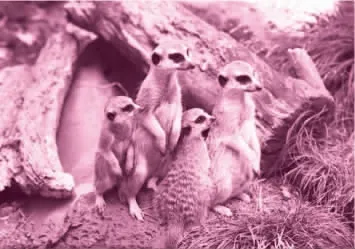Animals vote
2021-01-29甘肃天水市武山县第二中学赵亚利
甘肃天水市武山县第二中学 赵亚利

?
难词探意
1. baboon /bæ'buːn/ n. 狒狒
2. meerkat /'mɪəkæt/ n. 海猫
3. predator /'predətə(r)/ n. 捕食性动物
4. consensus /kən'sensəs/ n. 一致的意见;共识
Groups of people sometimes need to make decisions. Students might take a class vote on what book to read or game to play. Villagers might take a village vote to decide who will be their leader.But humans aren't the only creatures on Earth who vote. Other animals, from honeybees tobaboons,make group decisions. They just do it differently, and for different reasons. Instead of voting for a leader, animals vote on where to live or when to hunt. For years, scientists have studied animals' voting patterns and how these patterns affect group decisions.
Researchers have drawn comparisons between how people and animals make collective choices.Takemeerkatsfor example.“Meerkats,like humans,negotiate about decisions,”Marta Manser told TIME for Kids. Manser is an animal-behavior scientist at the University of Zurich, in Switzerland. She and two other scientists observed meerkats foraging for food in South Africa. They found that the animals foraged together for protection frompredators. But what happened when a meerkat wanted to speed up the search? The animal would make a “move call”. If three or more meerkats made this call, the group sped up.
Humans make decisions like this too. Manser says, “If you have a group of people, and one person says, ‘Let's go for pizza,’ and no one agrees, then nothing is going to happen. But once you have one or two other people saying, ‘That's a fantastic idea,’ the whole group will probably go out for pizza.”
African wild dogs in Botswana also vote in groups. In a 2017 study published in Proceedings of the Royal Society B,scientists found that after socializing, the pack would decide whether to hunt. How did the dogs cast a vote in favor of hunting? They sneezed! “Whether the dogs would actually go on a hunt was decided by the number of sneezes,” Andrew King says. King was a co-author of the study.The more the dogs sneezed, the more likely it was that the pack would look for a meal.
Just like humans, animals don't always agree with one another. But participating in group decisions helps ensure their survival. “It is fascinating to see how animals reach aconsensusand stick together,” King says.

Reading
Check
1. What can be inferred from the first paragraph?
A. Voting is not unique to humans.
B. All creatures have the act of voting.
C. Only humans have the act of voting.
D. Humans and animals have the same voting patterns.
2. What does the underlined phrase “foraging for” in paragraph 2 probably mean?
A. Preparing for. B. Feeding on. C. Hunting for. D. Throwing away.
3. If a meerkat wants to speed up the food search, how will the animal deal with it?
A. The animal will sneeze.
B. The animal will make a “move call”.
C. The animal will discuss with others.
D. The animal will forage together with others.
4. What is the benefit of participating in group decision-making?
A. Finding food. B. Ensuring survival.
C. Avoiding disasters. D. Electing a capable leader.
Language
Study
Sentence for writing
The more the dogs sneezed, the more likely it was that the pack would look for a meal.
【信息提取】该句使用了特殊句式:the +比较级+主语+谓语,the +比较级+主语+谓语。
【句式仿写】我越忙碌,就越感到充实。
